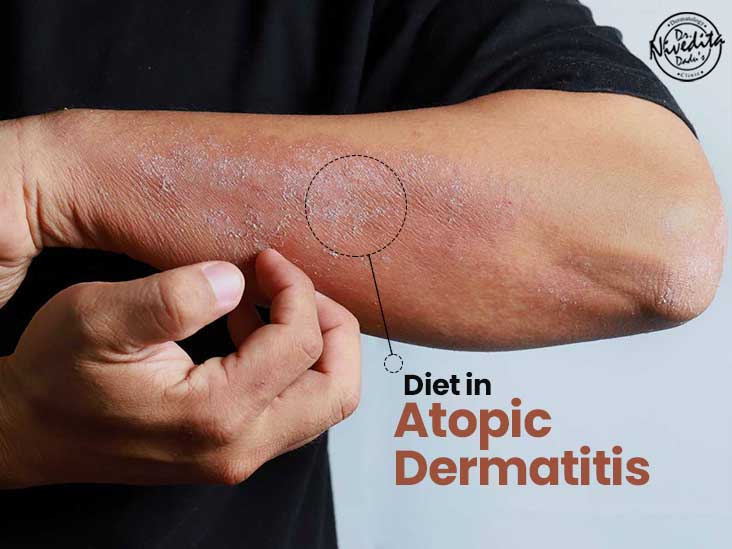Atopic dermatitis (AD) is an itchy skin disorder, and people with atopic dermatitis have dry and scaly skin involving a small part of the body or the entire body. It’s associated pruritus and increased serum level of IgE. It’s often associated with the history of ‘Atopic Diathesis’ like allergic rhinitis & asthma.
The dietary role in atopic dermatitis is controversial. Few dermatologists are convinced with the opinion of the role of diet in cause & treatment of atopic dermatitis, but others are not.
But these are studies which support that elimination of certain food articles from the diet, may improve the severity of atopic dermatitis.
Let us see which food products improve and which triggers flare-up atopic dermatitis. It’s seen most commonly in infancy upto age 2, out of which many children in their adulthood either do not or experience very few outbreaks. Exclusion and inclusion of certain dietary product have altered the disease process, according to some studies.
FOOD TO EAT
Fishes like salmon, rohu, tuna, albacore are rich in omega-3 fatty acid, which is known to fight inflammation in the body, so they are advised to be included in the diet of atopic patients.
Food that contains quercetin like apples, blueberries, cherries, spinach, and kale has powerful antioxidant properties which help in reducing inflammation.
Probiotics are also known to reduce inflammation, so they are thought to be helpful in atopic dermatitis. Like yogurt, pickles, traditional buttermilk, idli, dosa, dhokla, curd.
Few studies claim the infants have very low chances of developing eczema if their mothers were consuming probiotics for any indication. Probiotics are a type of beneficial bacteria, found in foods like yogurt and certain fermented foods. Probiotics contribute to regulate allergic hypersensitivity reaction. These days probiotics are available in dietary supplement form.
Foods rich in flavonoids also help in fighting inflammation, so they are good for people suffering from atopic dermatitis. It includes apples, broccoli, cherries, spinach.
FOOD TO AVOID
Food containing nickel – Canned meat, seeds, black tea. Avoiding these food products may experience benefit.
Milk & milk products should be avoided.
Eggs- Exclusion of egg from the diet has shown improvement. (On investigating it was found that specific IgE after eating eggs rises).
Seafood- Few fishes are found to help in reducing disease severity, but prawn and shellfish are advised to avoid as they can flare atopic dermatitis.
Food like- Tomato, brinjal, nuts, and berries are known to trigger the flare. Food and Agriculture Organization (FAO) technical consultation identified eight food groups as the most common cause of allergy worldwide- These are milk, egg, peanut, nut, wheat, soy, fish and shellfish.
Food additives- Azodyes, sulphites, and benzoates are also known to trigger the condition.
Few adult patients have shown an eczematous reaction to food that crosses reactive to ‘birch pollen.’ These include green apple, carrot, and pear. This is still under further studies.
In children less than 5 years of age, certain food articles are considered for evaluation of food allergy. These include milk, egg, peanut, wheat.
So, few studies have proved that there is a reduction in the severity of atopic dermatitis by eliminated certain dietary products. It is found that signs and symptoms are reduced, that means the severity of itching and surface area involved is also reduced. Elimination of dietary product for about 6 weeks is long enough to ensure that the removal of that product is beneficial in decreasing the disease process.
Failure in improvement when a particular food is stopped for a definite period suggests an alternative cause for the disease flare. So, elimination must not be solely based on the finding of food allergy, test results, until the worsening of symptoms have been noticed by the consumption of that particular food article. As most of the articles, as mentioned above, are a good source of protein and vitamins.
Keep Healthy! Keep Glowing!
Related Blogs: ATOPIC DERMATITIS SKIN DISORDER
: KNOW ALL ABOUT ATOPIC DERMATITIS AND HOW TO TREAT IT

